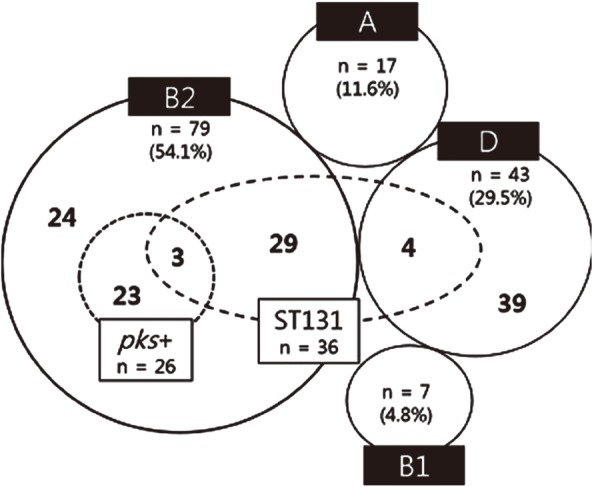Ann Lab Med.
2018 May;38(3):271-273. 10.3343/alm.2018.38.3.271.
Prevalence of Escherichia coli Carrying pks Islands in Bacteremia Patients
- Affiliations
-
- 1Department of Laboratory Medicine, Hanyang University College of Medicine, Seoul, Korea. yangsoon@hanyang.ac.kr
- KMID: 2403463
- DOI: http://doi.org/10.3343/alm.2018.38.3.271
Abstract
- Escherichia coli can harbor genomic pks islands that code for a polyketide-peptide genotoxin known as colibactin. E. coli strains carrying pks islands trigger genetic instability. pks islands have been significantly associated with bacteremia. We investigated the molecular epidemiology of bacteremic E. coli isolates and the prevalence of bacteremia-causing E. coli carrying pks islands. A total of 146 E. coli isolates were collected at a tertiary-care hospital from January 2015 to December 2016. The phylogenetic groups were determined by multiplex PCR. All isolates were screened by PCR for sequence type 131 (ST131)-associated single-nucleotide polymorphisms (SNPs) in mdh and gyrB. For detection of pks islands, we performed PCR for the clbB and clbN genes as colibactin system markers. Phylogenetic group B2 was the most common, accounting for 54.1% (N=79) of the isolates, followed by group D with 29.5% (N=43), group A with 11.6% (N=17), and group B1 with 4.8%. Of the group B2 isolates, 40.5% were ST131 strains and 32.9% carried pks islands. Only three ST131 isolates in group B2 carried the clbB and clbN genes, while the other 23 ST131 isolates did not. The pks gene might not be associated with ST131 strains.
Keyword
MeSH Terms
Figure
Reference
-
1. Bonacorsi S, Houdouin V, Mariani-Kurkdjian P, Mahjoub-Messai F, Bingen E. Comparative prevalence of virulence factors in Escherichia coli causing urinary tract infection in male infants with and without bacteremia. J Clin Microbiol. 2006; 44:1156–1158. PMID: 16517919.2. Wang MC, Tseng CC, Chen CY, Wu JJ, Huang JJ. The role of bacterial virulence and host factors in patients with Escherichia coli bacteremia who have acute cholangitis or upper urinary tract infection. Clin Infect Dis. 2002; 35:1161–1166. PMID: 12410475.3. Cuevas-Ramos G, Petit CR, Marcq I, Boury M, Oswald E, Nougayrede JP. Escherichia coli induces DNA damage in vivo and triggers genomic instability in mammalian cells. Proc Natl Acad Sci USA. 2010; 107:11537–11542. PMID: 20534522.4. Johnson JR, Johnston B, Kuskowski MA, Nougayrede JP, Oswald E. Molecular epidemiology and phylogenetic distribution of the Escherichia coli pks genomic island. J Clin Microbiol. 2008; 46:3906–3911. PMID: 18945841.5. CLSI. Performance standards for antimicrobial susceptibility testing. 25th ed. CLSI document M100-S25. Wayne, PA: Clinical and Laboratory Standards Institute;2015.6. Doumith M, Day MJ, Hope R, Wain J, Woodford N. Improved multiplex PCR strategy for rapid assignment of the four major Escherichia coli phylogenetic groups. J Clin Microbiol. 2012; 50:3108–3110. PMID: 22785193.7. Johnson JR, Menard M, Johnston B, Kuskowski MA, Nichol K, Zhanel GG. Epidemic clonal groups of Escherichia coli as a cause of antimicrobial-resistanturinary tract infections in Canada, 2002 to 2004. Antimicrob Agents Chemother. 2009; 53:2733–2739. PMID: 19398649.8. Nougayrede JP, Homburg S, Taieb F, Boury M, Brzuszkiewicz E, Gottschalk G, et al. Escherichia coli induces DNA double-strand breaks in eukaryotic cells. Science. 2006; 313:848–851. PMID: 16902142.9. Lee JH, Subhadra B, Son YJ, Kim DH, Park HS, Kim JM, et al. Phylogenetic group distributions, virulence factors and antimicrobial resistance properties of uropathogenic Escherichia coli strains isolated from patients with urinary tract infections in South Korea. Lett Appl Microbiol. 2016; 62:84–90. PMID: 26518617.10. Nicolas-Chanoine MH, Bertrand X, Madec JY. Escherichia coli ST131, an intriguing clonal group. Clin Microbiol Rev. 2014; 27:543–574. PMID: 24982321.
- Full Text Links
- Actions
-
Cited
- CITED
-
- Close
- Share
- Similar articles
-
- A Comparative Study of Community-acquired Klebsiella pneumoniae Bacteremia and Escherichia coli Bacteremia
- Risk Factors of Nosocomial Bacteremia of Extended-spectrum beta-Lactamase Producing Escherichia coli
- Acute Appendicitis Presenting with Escherichia coli Bacteremia without Perforation in a Healthy Male
- A Case of Escherichia Coli Empyema Preceded by Acute Pyelonephritis
- Escherichia coli O157: H7 Infection


